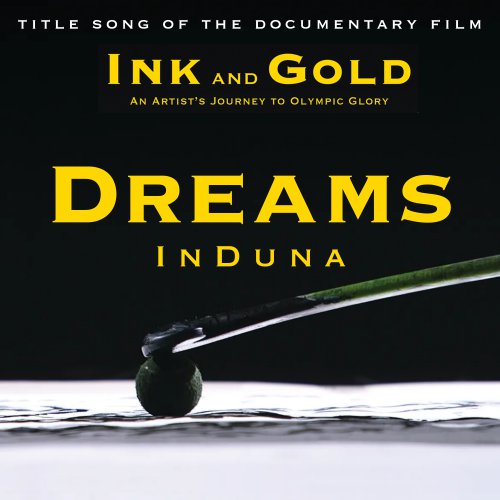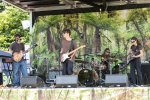InDuna - Single/Video Review: Dreams
 Ink and Gold: An Artist’s Journey to Olympic Glory is
a documentary about New Zealand artist and athlete, Zakea Page, winning the Lausanne 2020 Youth Olympic Games medal design competition. It’s an engaging short film to say the least, with a message about persevering despite the odds and celebrating the intersection of passions, in this case, sport and art.
Ink and Gold: An Artist’s Journey to Olympic Glory is
a documentary about New Zealand artist and athlete, Zakea Page, winning the Lausanne 2020 Youth Olympic Games medal design competition. It’s an engaging short film to say the least, with a message about persevering despite the odds and celebrating the intersection of passions, in this case, sport and art.
Page experienced a non-traditional upbringing as the child of international teachers, spending his childhood in New Zealand, Kuwait, Vietnam, England, Bangladesh and China. These experiences formed the foundation for his medal design, entitled “Beauty in Diversity”. In the film, Page performs at the opening ceremony with a hockey stick covered in ink, Jackson Pollock style, over a large white canvas. The film is unusual and ultimately uplifting.
Given how much praise the film has received from international festival selections and awards, it would always prove difficult to provide a soundtrack for the film that is as thought provoking and unique.
InDuna, a self-described ‘self-taught Afro-Kiwi singer and producer’, wrote Dreams for this story of determination. The song won Best Original Song at the International Online Web Fest (IOWF) where the film is nominated for six awards. On first listen, the song seems appropriate enough with a nod to dancehall and modern RnB. The lyrics are positive, especially the chorus (‘Dreams, I’m on my way, I’m on my way’) which form a catchy riff complete with a horn section.
The first lyrics establish the motif: “Dreams like this don’t come so easily, people working 9 to 5 just to put the dollar in the dream”. Two thematic words reappear throughout the song; dreams and dollar(s). Given New Zealand doesn’t have dollar bills, I can only assume this is a conceptual unit for either saving or putting toward the ‘dream’. A few instances of the dollar bill are a little lost on me: (“dollar dollar bill how you hating”) while other lyrics are a combination of the confessional and bragging variety: “Remember back back then in my heyday, when we used to tell ‘em dreams, they used to laugh, twenty years later, hi hater, we the best”.
It’s not quite the spirit of the film I believe, but the chorus is positive and catchy enough to dodge these issues. The influence of American hip-hop is rather obvious, and there is less of either the New Zealand flavour or an influence the countries Page has lived in. What is evidently absent is the shimmering South-African flavour like on All My Love, or the rich tapestry on offer in Strange Fruits with its tribal chant (“hala hala”) with the nod to UK garage.
The rest of the lyrics mention sacrifices, time and chasing (the dream). On paper, at least, it couldn’t be more appropriate to the film, and when heard during the film, it fits in nicely within the scenes not overpowering the dialogue or action. Watching the preview again, the song is perfect for the story, but as a song in and of itself it gets just a little repetitive toward the end, especially the ‘they used to laugh’ lyric reappearing far too much.
The video is simple but effective. Utilising strong lights and a white cyclorama, InDuna emotes as he performs, sometimes to the light and less often to the camera. There are enough shots to make it interesting, but after repeated watches, the song wears thin around the same time the video does. It may have been better to cut the song at the 2 minute mark, as the last minute is all descending energy, almost making it seem as if the ‘dream’ was not really worth it or there was some hidden tragedy to the sacrifices made.
Is it a good song, then? For the film, yes, absolutely. Is the song as effective as other InDuna songs? Perhaps not, but then I couldn’t see his other tracks being used in a film like Ink and Gold either. If this raises the profile of the artist riding on the coattails of the film, then that’s a good thing ... but I think InDuna has more flavoursome tracks to offer.
If you missed the film at the NZ Independent Film Festival screenings at Motueka, see it when it is widely available. It’s a stunning story and the soundtrack suits the vibe.
About InDuna

Born in South Africa, he had a rough childhood spending much of his early years growing up in the slums of Johannesburg and Limpopo. After moving into an orphanage at the age of eight, he was given the opportunity at fourteen to move to New Zealand.
InDuna started his music journey when he fell in love with music for the first time after hearing Brenda Fassie’s Nomakanjani. “It felt like love at first sight, but with music.” However, he only took an interest in producing his own music after high school. For the most part, music production has been an effective therapy for him to vent his emotions and to help cope with his past and present experiences. “The reason I started doing music was because I needed a way to handle my emotions and regular therapy wasn’t doing it for me.”
Visit the muzic.net.nz Profile for InDuna
Releases
Other Reviews By Nicholas Clark
 Search For Yeti - Album Review: Dark So Soon
Search For Yeti - Album Review: Dark So Soon
28 Nov 2024 // by Nicholas Clark
Search for Yeti’s first full length album Dark So Soon offers a rich banquet of genres and melodies. The record oscillates between predicting a future filled with either dread or hope, while the band either softly establishes a tender ambience or plays catchy power pop.
Read More...
 DarkWater - Album Review: Turning Point
DarkWater - Album Review: Turning Point
13 Nov 2024 // by Nicholas Clark
Turning Point is a complex, dynamic album that takes the listener on an intense ride. There are mysterious, fragile, powerful and gritty moments to discover on this ten-track offering that sounds both balanced and refined.
Read More...
 Job Site - EP Review: The New Zealand Experience
Job Site - EP Review: The New Zealand Experience
15 Oct 2024 // by Nicholas Clark
Emerging from the Waikato, high energy punk band Job Site showcases their special blend of comedic music on their latest offering, the 4 track The New Zealand Experience EP. The band plays fast and heavy throughout the recording, with rhythms that range from oi-punk, thrash music and even a little 2000’s indie rock.
Read More...
03 Sep 2024 // by Nicholas Clark
Six iconic venues. Twenty eight acts.
Read More...
 Voodoo Bloo - Album Review: Dead-end Rodeo
Voodoo Bloo - Album Review: Dead-end Rodeo
28 Aug 2024 // by Nicholas Clark
Rodeos, at least in this country, aren’t perceived as sport nowadays. If the term is used at all in New Zealand it usually refers to a metaphor for an intense struggle to survive or to conquer the unconquerable, if but for fleeting moment.
Read More...
 Gig Review: Bad Schematics @ Moon, Wellington - 26/07/2024
Gig Review: Bad Schematics @ Moon, Wellington - 26/07/2024
27 Jul 2024 // by Nicholas Clark
Fresh from picking up numerous awards in the recent National Battle of the Bands competition, Bad Schematics have embarked on a North Island tour including Tauranga, Auckland and their hometown Palmerston North, to promote their newest album,C O L L I D E. Tonight, along with winners of the competition for this year, Adoneye, finalists Donal and The Bucks and last year’s second place winners, Dave and the Dirty Humans, Bad Schematics hit Wellington’s favourite underground alternative music venue and pizzeria, Moon.
Read More...
 Gig Review: Floyd Marsden @ Valhalla, Wellington - 18/07/2024
Gig Review: Floyd Marsden @ Valhalla, Wellington - 18/07/2024
19 Jul 2024 // by Nicholas Clark
Although technically a sad affair, (as it was to be final of Floyd Marsden’s string of local shows promoting her album The Disco Lizards), the atmosphere in Valhalla was uncharacteristically filled with retro vibes but the usual friendly faces. In support for this show was Adult Friends, spearheaded by vocalist/guitarist Jackson Kidd who was also the producer of The Disco Lizards.
Read More...
 SuperMild - EP Review: SuperMild
SuperMild - EP Review: SuperMild
11 Jun 2024 // by Nicholas Clark
SuperMild is a busy band playing lots of venues and entertaining crowds with their blend of reggae tinged psychedelic rock. Their debut, self-titled four song EP is out now, and it spans the many sounds the band can summon with just three members.
Read More...
Most Viewed Artists
Latest Galleries

Evan Rhys & the Stereo Streets @ Festival of Lights - Pukekura Park, New Plymouth - 18/01/2025
Midwave Breaks @ Festival of Lights - Pukekura Park, New Plymouth - 18/01/2025
Rumpus Machine @ Music in Parks, Aotea Square, Auckland - 18/01/2025
Fan Club @ Music in Parks, Aotea Square, Auckland - 18/01/2025
NZ Top 10 Singles
- APT.
ROSÉ And Bruno Mars - DIE WITH A SMILE
Lady Gaga And Bruno Mars - BIRDS OF A FEATHER
Billie Eilish - TASTE
Sabrina Carpenter - I LOVE YOU, I'M SORRY
Gracie Abrams - ESPRESSO
Sabrina Carpenter - SAILOR SONG
Gigi Perez - LOSE CONTROL
Teddy Swims - A BAR SONG (TIPSY)
Shaboozey - GOOD LUCK, BABE!
Chappell Roan





 Report A Problem
Report A Problem

